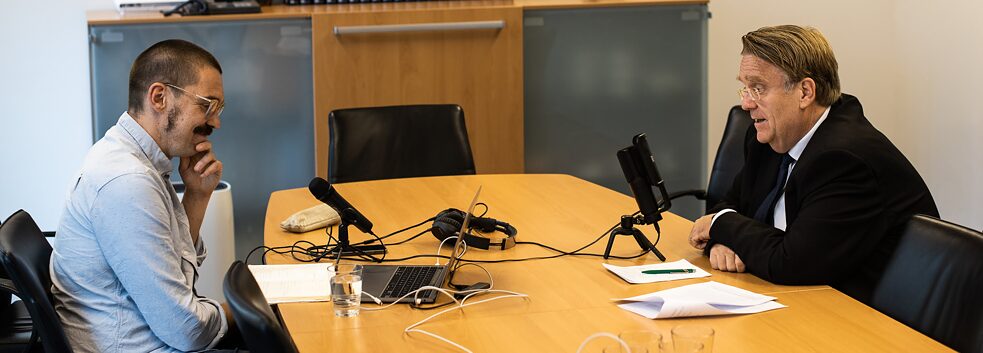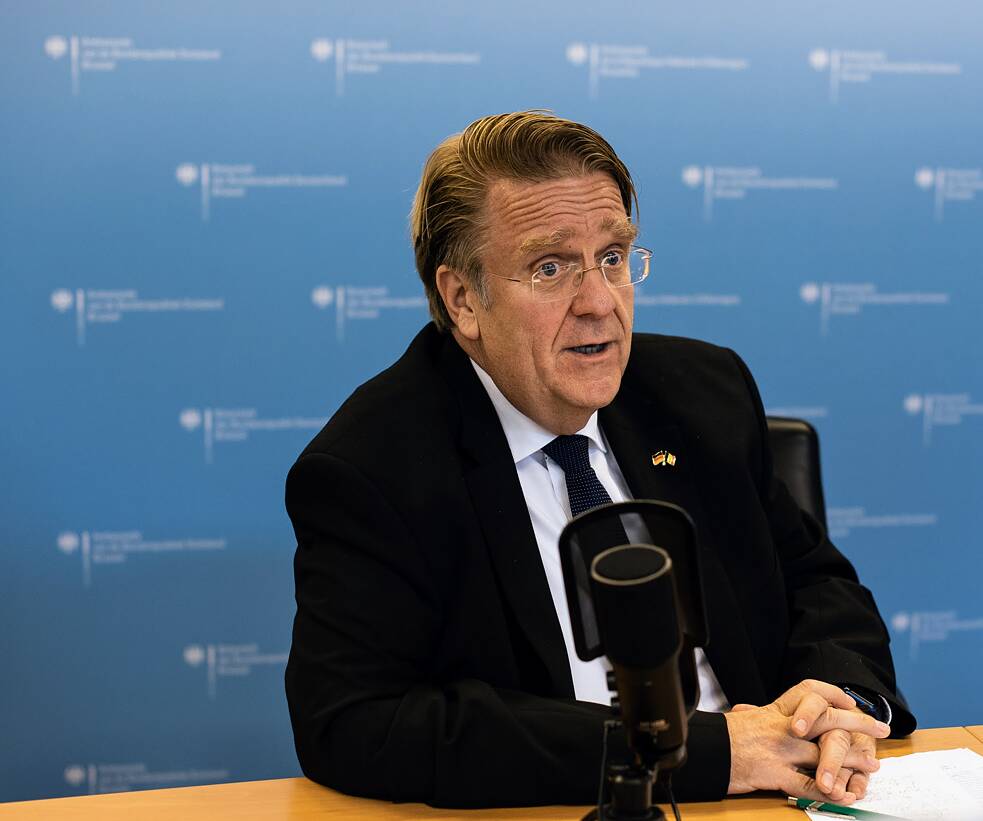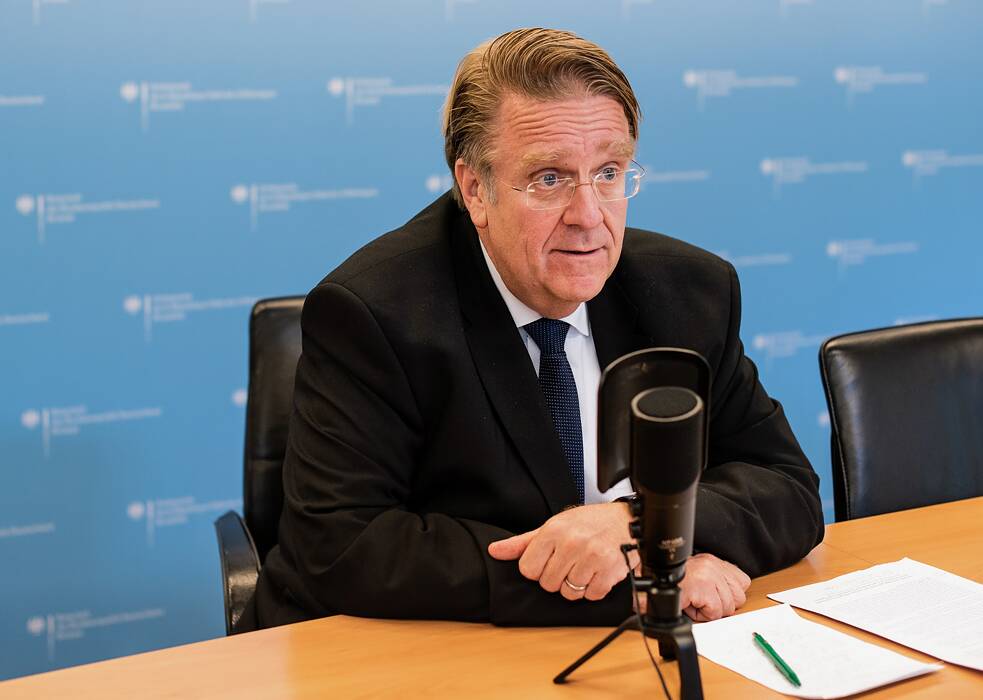"Week for German"
Interview with Ambassador Martin Kotthaus

© Goethe-Institut/ Tatjana Bratkina
The Goethe-Institut, with its ‘Europanetzwerk Deutsch’ programme, visited the German ambassador Martin Kotthaus in Brussels for the week of German. The qualified lawyer has spent time in many different places over the course of his life. He lived in Ghana, Egypt, Turkey and Brazil as a child with his parents. He has also served as a diplomat in Luanda, Washington, Brussels and Berlin. He returned for a second stint in Brussels in 2018 as Ambassador Extraordinary and Plenipotentiary to the Kingdom of Belgium. We caught up with him for an interview at the German embassy in Brussels.
Goethe-Institut Brüssel: The Goethe-Institut, with its ‘Europanetzwerk Deutsch’ programme, visited the German ambassador Martin Kotthaus in Brussels for German Week. The qualified lawyer has spent time in many different places over the course of his life. He lived in Ghana, Egypt, Turkey and Brazil as a child with his parents. He has also served as a diplomat in Luanda, Washington, Brussels and Berlin. He returned for a second stint in Brussels in 2018 as Ambassador Extraordinary and Plenipotentiary to the Kingdom of Belgium. We caught up with him for an interview at the German embassy in Brussels.
Goethe-Institut Brüssel: Mr Kotthaus, you’ve been in Brussels for a few years now, since 2018 to be exact, in your role as German ambassador. What events have marked your time here?
Martin Kotthaus: This is the second time I’ve been posted to Belgium. I was here for the first time from 2005 to 2011 at the permanent representation and have served as ambassador to the Kingdom of Belgium since 2018. Since 2018, I’ve been finding out exactly what I missed out on from 2005 to 2011. That was the time of the 2007 German Presidency of the EU Council and an even more important period for me personally as that’s when our two daughters were born. That meant I was either working or changing nappies so didn’t get the chance to see much of Belgium. Belgium is a country with so many different cities and cultures within such a small space, and even has three official languages. Where else do you find that in Europe? Obviously, my time here since 2018 has been shaped by the pandemic. During the coronavirus period, we managed to ensure that Germany never closed the border with Belgium. That wasn’t always an easy discussion due to various indicators and the divergent spread of the virus, but when you go to Eastern Belgium you realise borders don’t really matter anymore. People live in one country, work in a second, while their children go to school in a third. That meant maintaining cross-border life was vitally important. We succeeded and were also able to transport seriously ill coronavirus patients to Germany for treatment at hospitals in Nordrhein-Westfalen. We all tackled the pandemic crisis together at the European level. That was fantastic. The Russian war in Ukraine has clearly been a major event since 2022. It’s been significant because both countries – Germany and Belgium – have taken in lots of Ukrainian refugees. Both countries have also helped to keep Ukraine going by supplying weapons, financial services and other aid, working very closely with the European Union and the United Nations. There’s another thing I’d like to add – I arrived on the 100th anniversary of the end of the First World War. Some regions of Belgium were affected much more heavily by the First World War than the Second World War. That's especially the case in Flanders, where in some places few buildings are more than 100 years old. And to experience how the Belgians saw the end of the First World War in a European context was moving – in other words, a united Europe is the only solution to all these conflicts and how they approached Germany – which had invaded Belgium twice within a few decades – as a major partner and friend, and while today perhaps not best friend, certainly its best partner. For me, as the German ambassador who is invited to speak at many events, I’ve really come to appreciate how the Belgian people commemorate the past in this country.
Goethe-Institut Brüssel: The Goethe-Institut Belgium was founded in 1959 and so has existed for over 60 years. The ‘Europanetzwerk Deutsch’ programme celebrates its 30th anniversary next year. What’s so special about this programme for you in your role as an ambassador?
Martin Kotthaus I’ve supported it for many years and it’s really impressive to see the opportunities offered to the staff of the EU institutions in terms of language courses, on one hand, but also events and travel to Germany on the other. Very high-ranking contact partners take part in the programme. It provides outstanding, in-depth insights into the German political, economic, and cultural system and life, which is quite unique. The ‘Europanetzwerk’ is an excellent investment in my view – for a very specific group, obviously. But it’s always helpful if people at the EU institutions understand Germany on many different levels, not just with regard to cooperation at the Council of Ministers or in the committees, working groups, European Parliament and Commission, but also the many different aspects of Germany, including business, culture and politics. It’s a programme I’d like to participate in myself.
Goethe-Institut Brüssel: Belgium will hold the European Council Presidency in the first half of next year and will define various priorities. One of them is ‘life-long learning’. What approaches can be taken from this to promote the German language?
Martin Kotthaus: Learning is a continual, ongoing process today. That also includes languages in my opinion. While you can get by using tools today, speaking another language opens up a completely different world. Then you understand the culture, politics and what makes certain people tick. The programmes we’ve been running for many years at the embassy here in Belgium will continue. We have very good working relationships with other embassies of German-speaking countries – we cooperate with them on cultural programmes, but also, for example, on German Week which was introduced two years ago and takes place across Belgium once a year. This year we held over 40 online and offline events where we introduced people to the German language in fun ways. We’ve also created another highly successful initiative – a Germany Year at universities. We held one at the University of Mons, offering a wide range of activities, including a programme with one of Germany’s best-known comic illustrators, Flix, who provided an insight into German comics at an event on site. He also drew Spirou and Marsupilami, which was great and a unique experience. Then there’s an award programme run by the German Conference of Ministers of Education where school pupils can visit Germany for four weeks. Our approach is to create opportunities to discover German and learn it in an enjoyable way, which has proven very successful so far.
Goethe-Institut Brüssel: So a point you’ve already touched on is that there are three official languages in Belgium. Alongside Dutch and French, the third official language is German, which is mainly spoken in Eastern Belgium. It may sound a bit paradoxical but why does German still need to be promoted as a foreign language?
Martin Kotthaus There are just 80,000 German speakers in Eastern Belgium, but 130 million throughout the EU. That’s not a bad thing for German, but there are only 79,383 Eastern Belgians, to be precise, who speak German as their mother tongue and as an official language. And German is only an official language in Eastern Belgium. Overall, there’s competition between Dutch, French, English, Spanish and German. I understand all those people in Wallonia who take Dutch as their first foreign language simply because it’s the other major official language and everyone in Flanders who takes French as their first foreign language. English is obviously very important too. But then it gets a bit more interesting. What’s more relevant to someone – German or Spanish? German is often competing to be the third foreign language in schools. Overall, the number of people learning German in schools has fallen in recent years. Given that fact, you obviously have to do something, but can you even do something to change things? I strongly believe we can – not just because German is Belgium’s third official language but also because Germany is its biggest neighbour and most important trading partner. We also have much in common in terms of our industry and history. Speaking German here also opens up employment opportunities. Major German companies operate in Belgium: BASF, Audi, Covestro and even Brussels Airlines is part of the Lufthansa Group. There are many more large companies in the mobility, chemical and pharmaceutical sectors, all offering job opportunities. Considering the employment rate in Belgium is well below the 80% found in Germany or the Netherlands, this provides new opportunities and good career options. I believe you should always try to teach people German, but that’s always a personal choice. People are often put off because they think German is hard to learn. But as a German speaker, I would say it’s not that difficult. It’s not much more complex than other languages and it opens up lots of opportunities. That’s why we run lots of cooperation projects with schools. Here in Belgium, there are partner schools, immersion schools and lots of other institutions where German is taught, which we also try to promote and visit. What they do is very often impressive. Then we’ve got the Goethe-Institut here in Brussels which runs German courses at all levels. Even though it’s an official language, there’s no guarantee that Belgians besides the 79,383 living in the east of the country will want to learn German. We’ve all got to work together.
Goethe-Institut Brüssel: Germany is looking for specialists, as we’re all aware. There’s even a new immigration law that will gradually come into effect from November. We’ve already touched on it. Specialists who can speak German are also sought after in east Belgium. What potential do you see for the German language in Belgium in this context?
Martin Kotthaus: What I’ve said previously applies here too. The more languages you speak, the broader your education, the more you’ve seen of the world and the more internships you’ve done, the more attractive you are on the job market. People who can speak not just one or two, but even three languages, who have lived in a few different places and have gained practical work experience are much sought after and go straight from education into employment. Someone in my family is 21 and studying now could find a job tomorrow at 20 different companies with a salary that I could only have dreamt of when I graduated as a lawyer. The same is true here – the more qualifications you have, the more attractive you are as an applicant, especially now. Now where everyone is urgently looking for specialists, it’s one more qualification that might make a difference to your salary – but also to getting attractive opportunities. Speaking more languages may help you to advance in your management career and that’s where I believe German can play a key role in Belgium too.
Goethe-Institut Brüssel: You’re an ambassador, you spend a lot of time on the political scene in Brussels and speak to lots of people. In your experience, how can the education policy decision-makers in Belgium be encouraged to teach German more?
Martin Kotthaus I’ve found education policy decision-makers are always very open to the German language. It’s not like I have to say: ‘I’m the German ambassador, what do you think about German?’ Quite the opposite – it’s perceived positively but people always say, ‘we think it’s great and we’d like to do more but where are the German learners?’ There’s a huge shortage of German learners. You must accept that. There’s a shortfall of tens of thousands of teachers in Germany. Many thousands of teachers are needed in Belgium too, including German teachers. There are many reasons. That’s why the embassy – in collaboration with the Goethe-Institut – has been approaching German teachers at events etc. and why I regularly try to meet German teachers in their associations. Firstly, to recognise what they do and, secondly, to try to make being a German teacher more attractive by providing the opportunity to speak to people like an ambassador. It may also make German lessons more real when you can say these are the major issues in German-Belgian relations. The problem is less about raising awareness of the importance of German, and more about being able to act by having sufficient budget, enough teachers, and good enough facilities to teach German. Germany can help through school twinning schemes, etc. Ultimately, it’s a task for the Belgian and Community institutions but we’ll provide as much support as we can.
Goethe-Institut Brüssel: Thank you very much. That’s it for now then.
Martin Kotthaus It was a pleasure to be here.

